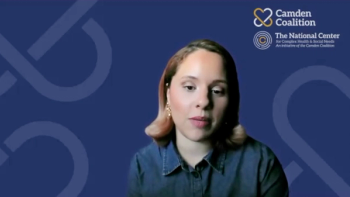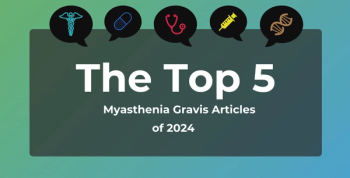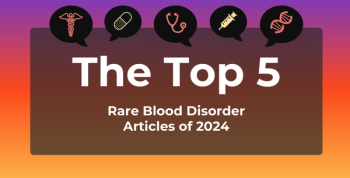
Gladys Antelo-Allen of Camden Coalition discusses a new skills lab offering accessible learning modules with 12 microlessons on best practices for approaching complex care.

Gladys Antelo-Allen of Camden Coalition discusses a new skills lab offering accessible learning modules with 12 microlessons on best practices for approaching complex care.

The FDA removed previously issued draft guidance on diversity in clinical trials from its website without public notice or explanation.

Suzetrigine (Journavx) is the first new drug approved to treat acute pain in over 20 years and the first to be classified as a selective NaV1.8 pain signal inhibitor, an alternative to opiates.

Sen. Bill Cassidy, MD, (R, Louisiana) holds a key vote on Robert F. Kennedy Jr's HHS Secretary confirmation. When Cassidy asked for a strategy on Medicare and Medicaid, Kennedy could not provide one.

Discussions also delved into the complexities of value-based oncology care, the growing role of real-world data, and strategies to improve access to care in hematology. Across all sessions, a common theme emerged: the need to balance innovation with patient-centered, equitable, and sustainable care models.

Highlights from last week include President Trump's executive orders, the FDA approval of esketamine nasal spray for depression, mental health access through Medicaid Managed Care, the impact of travel time on surgical outcomes, and life expectancy disparities.

Life expectancy gaps in the United States have widened dramatically over the past two decades, with disparities across racial, ethnic, and geographic lines reaching a staggering 20.4 years by 2021.

President Donald Trump's initial executive orders target previous efforts to reduce health care costs, pandemic preparedness, and international partnerships, showing a stark contrast to the Biden administration.

Esketamine (Spravato; Johnson & Johnson) is now the first and only monotherapy for adults with major depressive disorder (MDD) with inadequate response to at least 2 oral antidepressants.

The Center on Health Equity & Access provides news and expert insights on research, health policy, and the impact of social determinants on health.

Mutations in one of the first human-isolated strains of H5N1 bird flu in the US were identified by the Texas Biomedical Research Institute.

The COVID-19 pandemic accelerated the widespread adoption of telemental health care, and new research indicates significant racial and ethnic disparities in access to this technology among Medicaid beneficiaries with schizophrenia.

The study found significant disparities in the exposure to contaminants. Communities with higher percentages of Hispanic and Black residents were not only more likely to have unregulated chemicals in their drinking water, but they were also more frequently located near pollution sources.

The findings challenge the effectiveness of these widely used transitional care interventions and suggest a need for more targeted, multifaceted approaches to address the needs of higher-risk patients.

The health equity impact of the polypill is significant; by effectively controlling cardiovascular disease (CVD) risk factors in populations with limited health care access, there's potential to reduce income- and race-related health disparities.

Jessica Tracy, head of Growth and Partnerships at Enthea, shares how employers and unions can support mental health and address access barriers to evidence-based ketamine treatments.

ACA enrollment rate hits a milestone, though IRA subsidies may not extend beyond 2025; network adequacy standards fail to translate into efficient access to mental health care for Medicaid enrollees; research examines racial disparities in postpartum hypertension and vaccine uptake.

The increased urgency for vasectomy follow-through among men post-Dobbs aligns with previous administrative data indicating a rise in vasectomy procedure volumes after the decision.

Acts of discrimination, including subtle microaggressions, during pregnancy and childbirth contribute to higher maternal mortality rates, especially among Black women, and are linked to increased postpartum blood pressure, highlighting the need for improved health care interventions and racial equity in maternity care.

Doctors conducted suicide risk assessments for 42% of patients flagged by interruptive alerts, compared with only 4% with passive alerts.

Robin Glasco, MBA, Spencer Stuart, examines the crucial role of data in addressing urgent challenges in health care while inherent and systemic biases coexist, complicating efforts to achieve equity.

Acknowledging the disparity in pulse oximetry implicates a $2 billion industry that has faced stricter regulations in recent years in an attempt to address bias in the development and testing of these devices, the authors stated.

Review the most impactful news about myasthenia gravis (MG) in 2024.

The high health care burden faced by individuals with hemophilia underscores the urgent need for innovative treatments and improved diversity in clinical trials.

Sarah Ahmad, MBA, CEO of the Coalition for Affordable Quality Healthcare (CAQH), dives into the financial, physical, and emotional toll of neglecting women's health in an interview.

The most-read articles addressing mental health in 2024 spanned therapeutic advancements, research discoveries, and insight into enhanced practice guidelines.

The approval of concizumab-mtci (Alhemo) injection marks a significant milestone in managing hemophilia A and B with inhibitors by preventing or reducing bleeding episodes in adults and children 12 years and older.

The 2024 American Urological Association (AUA) annual meeting in San Antonio strongly emphasized diversity, equity, and inclusion, as well as innovations in robotic surgery and research methodologies.

The Center on Health Equity & Access provides news and expert insights on research, health policy, and the impact of social determinants on health.

Key findings from 2024 focused on conditions like vaccine-induced immune thrombotic thrombocytopenia, immune thrombocytopenia, and hemophilia, stressing the importance of early detection and innovative therapies.

259 Prospect Plains Rd, Bldg H
Cranbury, NJ 08512
© 2025 MJH Life Sciences®
All rights reserved.
